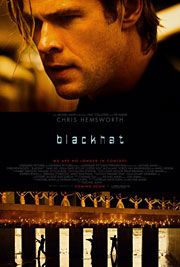
It’s been six years since Michael Mann’s last film (“Public Enemies”), and more than a decade since his last good one (“Collateral”), so it’s not very surprising that his newest movie doesn’t buck the trend, especially after Universal condemned it to a January release date. Mann is a director who not only seems wildly out of touch, but has come to care more about the look of his films than what they’re trying to say. To be fair, when the camera isn’t shaking around like it’s in the middle of an earthquake, “Blackhat” boasts some really gorgeous visuals, particularly the neon-drenched nighttime scenes. It’s just a shame that the story hasn’t been given the same attention, because while “Blackhat” is no worse than your standard Hollywood action-thriller, it would have been a lot more interesting to see Mann take a big risk and fail than to settle for such a safe, middling paycheck movie like this.
After a malicious hacker, or blackhat, causes a meltdown at a nuclear reactor in China and makes millions on the stock market by driving up the price of soy, FBI agent Carol Barrett (Viola Davis) is ordered to work with Chinese cyber-specialist Chen Dawai (Wang Leehom) to track down the person responsible. Chen notices that part of the computer code used in the attacks was co-written by him as a student at MIT, so he convinces the U.S. government to make a deal with the program’s lead architect, imprisoned hacker Nicholas Hathaway (Chris Hemsworth), in exchange for his help. Desperate to stop the elusive blackhat before the next attack, the FBI agrees to Hathaway’s demands, but when the investigation hits a dead end, he must decide between going back to prison and doing something illegal that, while it would keep the hunt alive, will land him in even more trouble if caught.
Hacking doesn’t exactly make for engaging cinematic material, because it basically just involves a guy sitting in front of a computer typing some code. Past movies have tried to make it sexier by visualizing the process with dumb CG sequences that go “inside” the computer (and Mann follows suit with a similar approach), but it never quite captures what’s really happening behind all those zeroes and ones. It’s for these reasons that “Blackhat” is staged more like a globe-trotting spy thriller with the odd hacking scene thrown in for good measure, and also why its hero isn’t just a computer genius, but a buffed-up MacGyver clone that can hold his own in a fight. Unfortunately, it doesn’t make the film that much more exciting, despite Mann’s attempts at placing the audience in the middle of the action with some (often shaky) in-your-face, handheld camera work.
Credit to Hollywood for producing a movie with two Asian leads, because while Chris Hemsworth may be the star of the film, relative unknowns Wang Leehom and Wei Tang (who plays Chen’s network engineer sister, Lien) are just as integral to the plot. Though it’s a little suspect that all of the Asian characters speak perfect English with nary an accent, Wang and Wei are among the movie’s few bright spots. Hemsworth does the best he can with such a dull, underdeveloped character (there’s a throwaway line about his relationship with his father that bizarrely pops up in the middle of a sex montage), but it’s such a waste of the actor’s charisma that it’s a wonder why he was even cast at all. In fact, while Mann’s films have always been very male-dominated, it’s the female characters that prove the most interesting, even if they aren’t given nearly enough to do, specifically the beautiful Wei (so good in Ang Lee’s “Lust, Caution”), who manages to shine despite being nothing more than a glorified sidekick/love interest.
Lien’s half-baked relationship with Hathaway, which is instigated mere days after they meet, is just one of the many unbelievable elements in the movie. Though Mann tries to counteract the implausibility of Morgan Davis Foehl’s script by instilling a sense of danger with real stakes, there’s too much working against it, including a faceless villain who isn’t very threatening (and even less so once he’s finally revealed), and an overly complex plot that fails to validate the sluggish, 135-minute runtime. But perhaps the most annoying thing about “Blackhat” is that it constantly brings up 9/11 as a measure of the level of terror that the hacker is capable of launching against the world, and yet the film never even considers going in that direction (his real motives are incredibly lame), to the point that it feels like it was made in another time, when the U.S. appeared impervious to such an attack. “Blackhat” could have been a very timely thriller about cyber-terrorism, especially in light of the recent Sony hacks, but instead, it’s just another style-over-substance misfire from Mann. Let’s call it “Miami Vice: Cyber Division.”
Related Posts
Comments Off on Movie Review: “Blackhat”
Posted in: Entertainment, Movie Reviews, Movies
Tags: Blackhat, Blackhat review, Chris Hemsworth, Michael Mann, Wei Tang
















